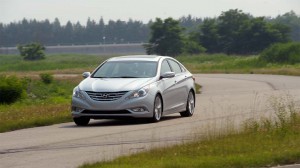Ford Motor Co. is firing a series of broadsides at South Korea, accusing the Asian nation of keeping its market closed to foreign cars, even as it uses a free trade deal negotiated with the United States to expand auto sales here to record levels.
Korean representatives dismissed the allegations and pointed to a 2007 trade agreement between the two countries designed to offset past problems that kept the Korean car market virtually closed.
“For every 52 cars Korea ships here, the U.S. can only export one there,” blared a new website posted by Ford, at www.ford.com/freetrade.
“We believe in free trade,” the website continued, “and this isn’t it,” it said, noting that only 5% of the currently cars sold in South Korea come from abroad.
Ford’s concerns about the Korean market can be better understood by recognizing that it has no direct access to what is otherwise one of the biggest Asian sources of car sales – unlike chief rival, General Motors. Until the late 1990s, Ford partnered with Korean carmaker Kia, but in the wake of the Asian economic meltdown that manufacturer was sold to its cross-town rival, Hyundai.
General Motors, on the other hand, was able to use the financial crisis to gain control of Korea’s third-largest carmaker, Daewoo, in 2002. Now marketing under the Chevrolet brand, that gives GM direct access to what most foreign manufacturers agree is a closed market.
The Koreans, however, are defending their practices, and point to the fact that while still small, foreign vehicle sales have been growing at an annual rate of 41% since 2000.
The Koreans, as part of a 2007 trade agreement negotiated by the Bush Administration, promised to immediately eliminate an 8% tariff on imported automobiles, while the U.S. agreed to phase out its own tariffs on Korean cars over a 10-year period. But the trade agreement was never approved by Congress.
Meanwhile, industry experts contend there are other institutional restrictions on imports, though other observers caution that there are also social strictures against foreign cars. And many of the models Detroit has tried to market in Korea are simply too large for the market, which has generally favored smaller vehicles with compact, fuel-efficient engines for its crowded urban roads.
Nonetheless, Ford has been blasting the Korean in a series of ads run in newspapers across the country, and on the new website.
“The key message here is that the Koreans have to open their market to the U.S. automotive industry,” Ford Vice President Steve Biegun said Wednesday.
The potential for trade problems between the U.S. and Korea is something company insiders at Hyundai and Kia admit they are well aware of – and concerned about. The two brands have been setting sales records in recent months – and seen their combined share of the American market jump to 6.4% — and hope to avoid getting caught in the middle of the dispute.
But they have been taking steps to offset the issue by setting up their own assembly plants in the U.S., Hyundai with a plant in Alabama, Kia with a new factory in Georgia.

